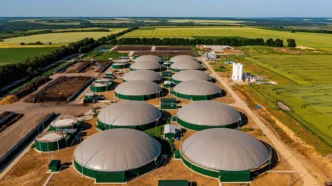Plenium Partners, a Spanish energy company, has reached a major milestone in its efforts to decarbonise Europe’s energy sector. The company has secured €25 million in funding from ING Italia to support the construction of its first biomethane plant in northern Italy. This financing, structured as a bilateral Project Finance agreement, underscores growing investor confidence in renewable gases and sets a new benchmark for circular economy projects in regions traditionally dependent on fossil fuels.
The €25 million financing package provided by ING Italia, a leader in sustainable banking, will fund the construction and commissioning of the Pavia plant. This marks the first operational phase in Plenium Partners’ ambitious four-facility platform. The Project Finance model used in this deal allows Plenium to transfer the risks associated with construction and operation to dedicated project vehicles, while securing long-term debt at competitive rates. This approach not only safeguards returns for investors but also accelerates deployment timelines.
Circular Energy: A National Platform in the Making
Located in the heart of Lombardy’s agricultural region, the Pavia facility is expected to begin operations by Q1 2026. The plant will make use of abundant livestock and crop residues from local farms, ensuring a steady supply of feedstock. Each plant will process nearly 50,000 tonnes of organic waste annually, and when all four plants are operational, they will collectively divert 200,000 tonnes of material from landfills. This initiative aligns with Italy’s broader waste-to-wealth goals.
The project is part of a broader collaboration launched in mid-2024 between Plenium Partners and Aragorn Value Leadership under the Ecualia Capital fund. With an investment exceeding €100 million, the plan involves constructing four plants across Italy, each with the capacity to produce 500 standard cubic metres of biomethane per hour. The project’s bankability is further supported by Plenium’s successful participation in GSE’s third biomethane tariff auction, which guarantees financial incentives.
Plenium’s biomethane plants are distinct from conventional anaerobic digestion facilities. The company’s design incorporates carbon dioxide (CO2) capture and purification systems, which recycle CO2 rather than venting it into the atmosphere. This added technology will contribute to a higher net reduction in greenhouse gas emissions, supporting Italy’s ambitious environmental targets. Additionally, the recovered CO2 could be sold or utilized in industries such as food and beverage, horticulture, or chemicals, creating new revenue streams for the project.
Biomethane: A Key Player in Europe’s Clean Energy Future
Founded in Spain in 2007, Plenium Partners has steadily grown its presence, entering the Italian market in 2010. The company currently manages more than 35 operational photovoltaic assets across Italy, demonstrating its expertise in project development, financing, and operations. The new biomethane platform represents a strategic diversification into gas-based renewables, complementing the company’s existing solar energy portfolio.
Biomethane, produced from agricultural residues, manure, and organic waste, offers dual benefits: it helps mitigate methane emissions from decaying biomass while displacing the use of natural gas. In rural areas, these plants generate local jobs, offer new income streams for farmers, and stimulate growth in related sectors, such as waste collection and maintenance services.
As Europe works towards its 2030 climate and energy goals, biomethane will play an increasingly crucial role alongside electrification and hydrogen. It is expected to form the core of the region’s circular bioeconomy, driving sustainable development.
Plenium Partners’ Pavia project is not just a singular initiative. It highlights how targeted finance, innovative technology, and cross-sector partnerships can unlock the potential of renewable gases. As the plant prepares for production in 2026, it marks a significant step in Italy’s energy transition, where waste is transformed into a valuable resource, advancing Europe’s path to decarbonisation through green energy molecules.













